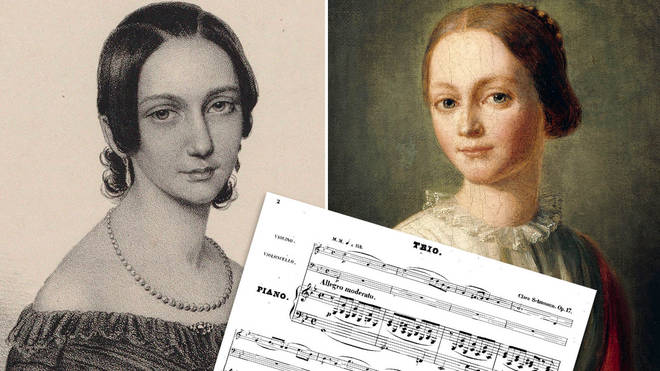It's all about the classical music composers and their works from the last 400 years and much more about music. Hier erfahren Sie alles über die klassischen Komponisten und ihre Meisterwerke der letzten vierhundert Jahre und vieles mehr über Klassische Musik.
Total Pageviews
Thursday, February 16, 2023
Pink Floyd - Shine On You Crazy Diamond 1990 Live Video
James Bond Theme (From "Dr. No")
MSO's Tribute to Ryan Cayabyab: Tuwing Umuulan at Kapiling Ka
Queen - Bohemian Rhapsody (Orchester-Version) | WDR Funkhausorchester
Wednesday, February 15, 2023
Debussy - Arabesque No.1 and No.2
9 of Clara Schumann’s all-time best pieces of music
By Maddy Shaw Roberts, ClassicFM
We explore the musical canon of one of the Romantic period’s most unsung composers.
A virtuosic pianist and brilliant composer, Clara Schumann was one of the stars of the Romantic era – but her music hasn’t always been given the credit it deserves.
Working in a field overwhelmingly dominated by men, the 19th-century musician is quoted as saying sometime in her later years: “I once believed that I possessed creative talent, but I have given up this idea; a woman must not desire to compose – there has never yet been one able to do it. Should I expect to be the one?”
Despite the obstacles she faced, Clara Schumann’s canon includes 30 Lieder, choral music, solo piano pieces, one piano concerto, plus chamber and orchestral works. Here are the most memorable among them.
Piano Concerto in A minor
Clara Schumann was one of the most acclaimed pianists of her time and wrote exquisitely and extensively for the instrument. This beautiful piano concerto gives us more than a hint of her incredible pianism and musical imagination.
Piano Trio in G minor
This gorgeous chamber composition for violin, piano and cello has been called a “masterpiece” among Clara Schumann’s works.
She wrote it in the summer of 1846, during a traumatic period of her somewhat turbulent life. Her husband, Robert Schumann, was extremely ill and the couple had travelled to Nordeney in an attempt to improve his health condition. Clara, who had recently fallen pregnant, suffered a miscarriage during their stay on the island.
Clara’s trio is said to have greatly influenced her husband’s first piano trio, Op. 63, which was written a year later.
6 Lieder, Op.13
After her marriage Clara turned, to some extent, away from writing for the piano, and towards lieder and choral works. These Sechs Lieder, or Six Songs, are a setting of the romantic poems of Herine, Geibel and Rckert. Written in the first weeks of her nuptials, the songs convey the intimacy of the first, blissful season of marriage.
Variations on a theme by Robert Schumann
The Schumanns had a close relationship, emotionally and musically, and their works were frequently paired at concerts.
These Variations are almost a love letter to the couple’s passion for music-making, the seven moments gradually developing Robert Schumann’s simple theme into an intricate, expansive work for the keyboard.
Three Romances
Romances were one of Clara Schumann’s favourite forms to compose in, and these are some of her most exquisite. She toured the piece and played it before royalty with its dedicatee, her close friend and violin virtuoso, Joseph Joachim.
One critic said at the time: “All three pieces display an individual character conceived in a truly sincere manner and written in a delicate and fragrant hand.”
Scherzo No. 2 in C minor
A pianist herself, Clara Schumann loved to write flourishing works for the piano that showed the virtuosity of the performer.
Her Scherzo No. 2 is fiery and beautifully nuanced – hear it played below by the brilliant young piano star Isata Kanneh-Mason, a 21st-century champion for Clara’s music.
4 Pièces caractéristiques
Clara frequently performed this piece during her early career. And at one performance, who should be in the crowd but her contemporary, Polish piano virtuoso and composer Frédéric Chopin, who found himself captivated by Clara’s work.
Its lively opening, marked ‘Allegro furioso’, is delightfully contrasted by its plaintive third movement, marked ‘Andante con sentimento’.
Impromptu in E major
A largely forgotten work, the ‘Impromptu’ is bliss in a bottle for lovers of Romantic piano music. Composed in 1844, it was not published until 1885, when Schumann was well into her 60s and still delighting concert audiences.
Soirées Musicales
The Soirées Musicales comprise six miniatures – a Toccatina, a Notturno, two Mazurkas, a Ballade and a rhythmic Polonaise, all familiar-sounding titles for fans of Chopin’s music. The ‘Polonaise’, in particular, gently nods to the Polish giant’s form.


